Publications
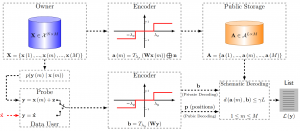
Privacy Preserving Identification Using Sparse Approximation with Ambiguization
IEEE International Workshop on Information Forensics and Security (WIFS'2017)
In this paper, we consider a privacy-preserving encoding framework for identification applications covering biometrics, physical object security and the Internet of Things (IoT). The proposed framework is based on a sparsifying transform, which consists of a trained linear map, an element-wise nonlinearity, and privacy amplification. The sparsifying transform and privacy amplification are not symmetric for the data owner and data user. We demonstrate that the proposed approach is closely related to sparse ternary codes (STC), a recent information-theoretic concept proposed for fast approximate nearest neighbor (ANN) search in high dimensional feature spaces that being machine learning in nature also offers significant benefits in comparison to sparse approximation and binary embedding approaches. We demonstrate that the privacy of the database outsourced to a server as well as the privacy of the data user are preserved at a low computational cost, storage and communication burdens.
@inproceedings { Razeghi2017wifs,
author = { Razeghi, Behrooz and Voloshynovskiy, Slava and Kostadinov, Dimche and Taran, Olga },
booktitle = { IEEE International Workshop on Information Forensics and Security (WIFS) },
title = { Privacy Preserving Identification Using Sparse Approximation with Ambiguization },
address = { Rennes, France },
pages = { 1--6 },
month = { December },
year = { 2017 }
}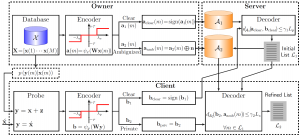
Privacy-Preserving Outsourced Media Search Using Secure Sparse Ternary Codes
43rd IEEE International Conference on Acoustics, Speech and Signal Processing (ICASSP'2018)
In this paper, we propose a privacy-preserving framework for outsourced media search applications. Considering three parties, a data owner, clients and a server, the data owner outsources the description of his data to an external server, which provides a search service to clients on the behalf of the data owner. The proposed framework is based on a sparsifying transform with ambiguization, which consists of a trained linear map, an element-wise nonlinearity and a privacy amplification. The proposed privacy amplification technique makes it infeasible for the server to learn the structure of the database items and queries. We demonstrate that the privacy of the database outsourced to the server as well as the privacy of the client are ensured at a low computational cost, storage and communication burden.
@inproceedings { Razeghi2018icassp,
author = { Razeghi, Behrooz and Voloshynovskiy, Slava},
booktitle = { IEEE International Conference on Acoustics, Speech and Signal Processing (ICASSP) },
title = { Privacy-Preserving Outsourced Media Search Using Secure Sparse Ternary Codes },
address = { Calgary, Alberta, Canada },
pages = { 1--5 },
month = { April },
year = { 2018 }
}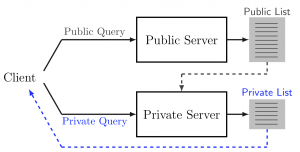
Privacy-Preserving Identification via Layered Sparse Code Design: Distributed Servers and Multiple Access Authorization
26th European Signal Processing Conference (EUSIPCO'2018)
We propose a new computationally efficient privacy- preserving identification framework based on layered sparse coding. The key idea of the proposed framework is a sparsifying transform learning with ambiguization, which consists of a trained linear map, a component-wise nonlinearity and a privacy amplification. We introduce a practical identification framework, which consists of two phases: public and private identification. The public untrusted server provides the fast search service based on the sparse privacy protected codebook stored at its side. The private trusted server or the local client application performs the refined accurate similarity search using the results of the public search and the layered sparse codebooks stored at its side. The private search is performed in the decoded domain and also the accuracy of private search is chosen based on the authorization level of the client. The efficiency of the proposed method is in computational complexity of encoding, decoding, “encryption” (ambiguization) and “decryption” (purification) as well as storage complexity of the codebooks.
@inproceedings { Razeghi2018eusipco,
author = { Razeghi, Behrooz and Voloshynovskiy, Slava and Ferdowsi, Sohrab and Kostadinov, Dimche },
booktitle = { 26th European Signal Processing Conference (EUSIPCO) },
title = { Privacy-Preserving Identification via Layered Sparse Code Design: Distributed Servers and Multiple Access Authorization },
address = { Rome, Italy },
pages = { },
month = { September },
year = { 2018 }
}
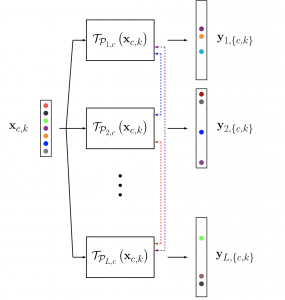
Learning Discrimination Specific, Self-Collaborative and Nonlinear Model
IEEE Internacial Conference on Big Knowlage (ICBK'2018)
This paper presents a novel nonlinear transform model for learning of collaboration structured, discriminative and sparse representations. The idea is to model a collaboration corrective functionality between multiple nonlinear transforms in order to reduce the uncertainty in the estimate. The focus is on the joint estimation of a data-adaptive nonlinear transforms (NTs) that take into account a collaboration component w.r.t. a discrimination target. The joint model includes minimum infor- mation loss, collaboration corrective and discriminative priors. The model parameters are learned by minimizing the empirical negative log likelihood of the model, where we propose an efficient solution by an iterative, coordinate descend algorithm. Numerical experiments validate the potential of the learning principle. The preliminary results show advantages in comparison to the state- of-the-art methods, w.r.t. the learning time, the discriminative quality and the recognition accuracy.
@inproceedings { Kostadinov2018:ICBK,
author = { D. Kostadinov, and B. Razeghi, and S.Voloshynovskiy, and S.Ferdowsi },
year = { 2018 },
month = { November },
title = { Learning Discrimination Specific, Self-Collaborative and Nonlinear Model },
booktitle = { IEEE International Conference on Big Knowledge (ICBK) },
pages = { },
address = { Singapore }}
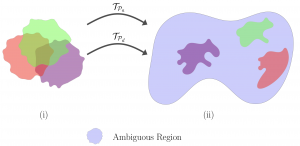
Supervised Joint Nonlinear Transform Learning with Discriminative-Ambiguous Prior for Generic Privacy-Preserved Features
53rd Annual Conference on Information Systems & Sciencese (CISS'2019)
In this paper, we explicitly model a discriminative- ambiguous setup by two jointly learned parametric nonlinear transforms. The idea is to use one nonlinear transform for ambiguization and the other one for discrimination, and also to address a privacy-utility setup that is conditioned on am- biguization and discrimination priors, respectively, together with minimum information loss prior. The generic coupled representa- tion is composed by linear combination using the two nonlinear transforms. The model parameters are learned by minimizing the empirical log likelihood of the model, where we propose an efficient solution using block coordinate descend alternating al- gorithm. The proposed model has low computational complexity and high recognition accuracy for the authorized parties while having low recognition accuracy for the unauthorized parties. We validate the potential of the proposed approach by numerical experiments.
@inproceedings {Kostadinov2019ciss,
author = { Kostadinov, Dimche and Razeghi, Behrooz and Rezaeifar, Shideh and Voloshynovskiy, Slava },
booktitle = { 53rd Annual Conference on Information Systems & Sciencese (CISS) },
title = { Supervised Joint Nonlinear Transform Learning with Discriminative-Ambiguous Prior for Generic Privacy-Preserved Features },
address = { Maryland, USA },
pages = { },
month = { March },
year = { 2019 }}
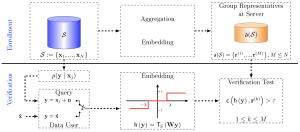
Aggregation and Embedding for Group Membership Verification
44th IEEE International Conference on Acoustics, Speech and Signal Processing (ICASSP'2019)
This paper proposes a group membership verification pro- tocol preventing the curious but honest server from recon- structing the enrolled signatures and inferring the identity of querying clients. The protocol quantizes the signatures into discrete embeddings, making reconstruction difficult. It also aggregates multiple embeddings into representative values, impeding identification. Theoretical and experimental results show the trade-off between the security and the error rates.
@inproceedings { Razeghi2019icassp,
author = { Gheisari, Marzieh and Furon, Teddy and Amsaleg, Laurent and Razeghi, Behrooz and Voloshynovskiy, Slava },
booktitle = { IEEE International Conference on Acoustics, Speech and Signal Processing (ICASSP) },
title = { Aggregation and Embedding for Group Membership Verification },
address = { Brighton, United Kingdom },
month = { May },
pages = { },
year = { 2019 }
}

Reconstruction of Privacy-Sensitive Data from Protected Templates
26th IEEE International Conference on Image Processing (ICIP'2019)
In this paper, we address the problem of data recon- struction from privacy-protected templates, based on recent concept of sparse ternary coding with ambiguization (STCA). The STCA is a generalization of randomization techniques which includes random projections, lossy quantization, and addition of ambiguization noise to satisfy the privacy-utility trade-off requirements. The theoretical privacy-preserving properties of STCA have been validated on synthetic data. However, the applicability of STCA to real data and po- tential threats linked to reconstruction based on recent deep reconstruction algorithms are still open problems. Our results demonstrate that STCA still achieves the claimed theoretical performance when facing deep reconstruction attacks for the synthetic i.i.d. data, while for real images special measures are required to guarantee proper protection of the templates.
@inproceedings { Razeghi2019icip,
author = { Rezaeifar, Shideh and Razeghi, Behrooz and Taran, Olga and Holotyak, Taras and Voloshynovskiy, Slava },
booktitle = { IEEE International Conference on Image Processing (ICIP) },
title = { Reconstruction of privacy-sensitive data from protected templates },
address = { Taipei, Taiwan },
month = { September },
pages = { },
year = { 2019 }
}

Single-Component Privacy Guarantees in Helper Data Systems and Sparse Coding with Ambiguation
IEEE International Workshop on Information Forensics and Security (WIFS'2019)
We investigate the privacy of two approaches to (biometric) template protection: Helper Data Systems and Sparse Ternary Coding with Ambiguation. In particular, we focus on a privacy property that is often overlooked, namely how much leakage exists about one specific binary property of one component of the feature vector. This property is e.g. the sign or an indicator that a threshold is exceeded. We provide evidence that both approaches are able to protect such sensitive binary variables, and discuss how system param- eters need to be set.
@inproceedings { Razeghi2019wifs,
author = { Razeghi, Behrooz and Stanko, Taras and Škoric´, Boris and Voloshynovskiy, Slava },
booktitle = { IEEE International Workshop on Information Forensics and Security (WIFS) },
title = { Single-Component Privacy Guarantees in Helper Data Systems and Sparse Coding with Ambiguation },
address = { Delft, Netherlands },
pages = { },
month = { December },
year = { 2019 }
}
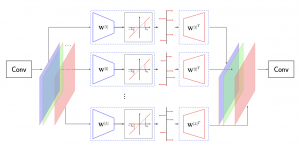
Privacy-Preserving Image Sharing via Sparsifying Layers on Convolutional Groups
45th IEEE International Conference on Acoustics, Speech and Signal Processing (ICASSP'2020)
We propose a practical framework to address the problem of privacy-aware image sharing in large-scale setups. We ar- gue that, while compactness is always desired at scale, this need is more severe when trying to furthermore protect the privacy-sensitive content. We therefore encode images, such that, from one hand, representations are stored in the pub- lic domain without paying the huge cost of privacy protec- tion, but ambiguated and hence leaking no discernible content from the images, unless a combinatorially-expensive guessing mechanism is available for the attacker. From the other hand, authorized users are provided with very compact keys that can easily be kept secure. This can be used to disambiguate and reconstruct faithfully the corresponding access-granted images. We achieve this with a convolutional autoencoder of our design, where feature maps are passed independently through sparsifying transformations, providing multiple com- pact codes, each responsible for reconstructing different at- tributes of the image. The framework is tested on a large-scale database of images with public implementation available.
@inproceedings { ICASSP20_Privacy,
author = { Ferdowsi, Sohrab and Razeghi, Behrooz and Holotyak, Taras and P. Calmon, Flavio and Voloshynovskiy, Slava },
booktitle = { IEEE International Conference on Acoustics, Speech and Signal Processing (ICASSP) },
title = { Privacy-Preserving Image Sharing via Sparsifying Layers on Convolutional Groups },
year = { 2020 }
}
